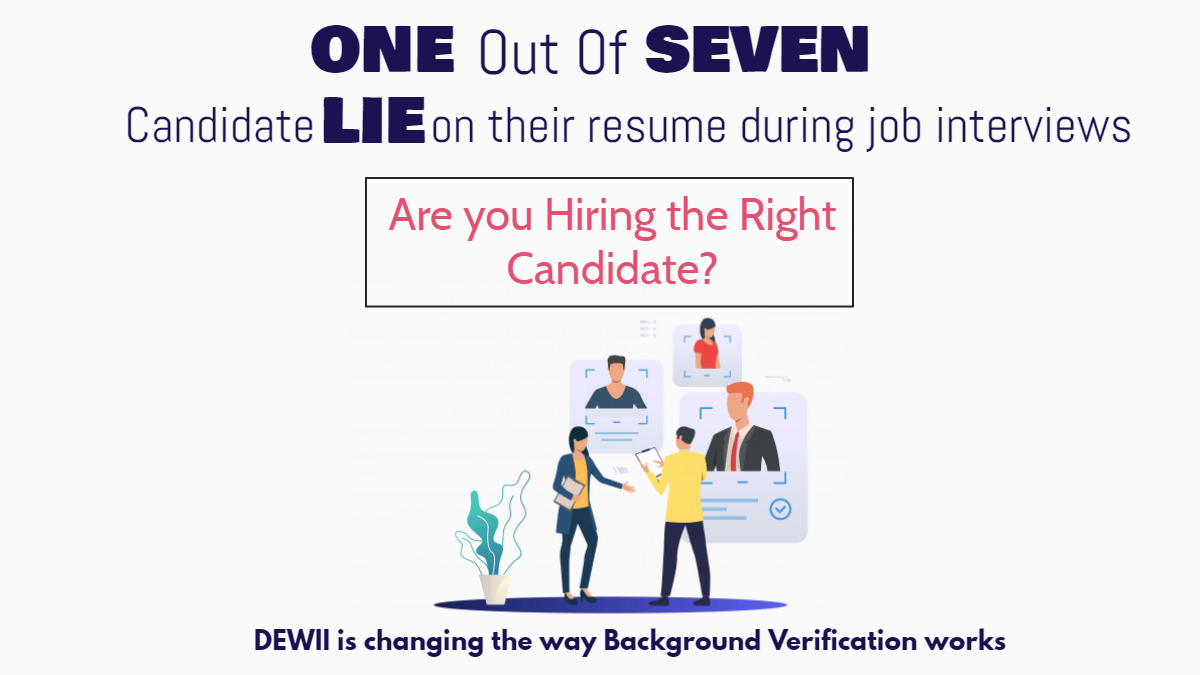DEWII Blog

85 Percent of Job Applicants Lie on Resumes
You know 85 percent of applicants lie about their credentials on the resumes. The organizations nowadays have started to track an applicant’s credentials, but the number is still growing. What do you think is the reason for this fudging?
According to the studies, most of the employees either lie about their education and employment history. The demerits of lying on the resumes are that the risk of being caught is high. Some recruiters simply check on the social media, the profiles of the candidates and verify the lie. But social media is also surely not an authenticated source especially in the era of fake news. So, what exactly is an ideal organization can do and how it can track if the employee is lying or not? Here are some simple tips.
Background Checks
A background check is an intensive method by which a recruiter can spot easily if a candidate is lying about any of his records or not. A workforce is the face of an organization. It defines who you are. Hence, it is very important to invest in the people who are a part of your organization and choose your candidates wisely. Background verification makes it possible for you to make your hiring decisions ideal by checking candidates’ identity, education, professional, criminal background and reputation.
What a company can dig in Background Verification?
1. Verification of academic credentials. The background verification company will verify the educational institute from where a candidate has studied, apparently, the candidate said he has. If you have not given dates of your education on your degree, then it’s okay when it comes to resume but not when it comes to the job application because companies need and use dates for a background check. Also, if you have changed your name then you will have to give the company your former name. 2. Verification of previous employment. The verification of previous employment includes position, longevity, salary, and job performance. There are two types of checks. The first is simply an employment verification which is either done through a phone call to your former company's HR department. Another one is to verify your previous employment by looking at your W2s or other tax records. 3. Personal references and verification of letters of recommendation. Then there are personal references and verification of the letter of recommendation which includes speaking with former bosses and (sometimes) coworkers. Some people believe that speaking to bosses requires a candidate’s
permission which is not true in reality. A background check can be done without any permission. 4. Drug screens and physical exams. Some jobs require drug screens and a physical exam. Drug screens have become common phenomena in organizations these days because of today’s generation being addicted to the drug. 5. Skills and knowledge of the candidate. There are certain tests that are conducted for the employees to check their ability to do said work. 6. Criminal background checks. This is an important aspect of the background check of an employee. A company verifies if a candidate has any criminal record or background. This is very important for the safety of the organization and the existing employees. 7. This one is specifically for accounting and finance professionals, credit checks. If a job involves security or the handling of money, then a candidate has to sign a document allowing them to check his credit. Additionally, the EEOC strongly cautions against the over-use of credit checks.
Reference Checks
Background Check is merely one part of recruitment, there is another part of it, known as a reference check. In the background check companies, we verify the background of the employees whereas in a reference check, the verification is conducted by contacting different references given by the candidate during the interview. This include contacting the candidate’s previous employer, school, etc. In today’s scenario, the main motive of the reference check is not only to validate the candidate’s authenticity but to learn his strengths and limitations.
Without these steps, an employer cannot know that if the resume provided by the candidate is distorted or not. Moreover, it can also define
the character of the candidate and largely helps in the recruitment process

